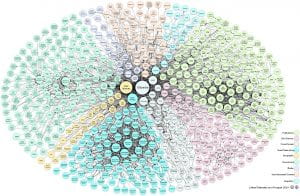 Recently, an increased number of data papers has been published – that is, articles which point users to high quality datasets and describe how those datasets were created. Unlike traditional publications, data papers don’t interpret or analyze the data. The goal of these papers is to bring valuable datasets to the wider research community so that researchers can use them to identify new relationships within the datasets. However, similar to traditional articles, data papers do usually undergo a standard peer review process.
Recently, an increased number of data papers has been published – that is, articles which point users to high quality datasets and describe how those datasets were created. Unlike traditional publications, data papers don’t interpret or analyze the data. The goal of these papers is to bring valuable datasets to the wider research community so that researchers can use them to identify new relationships within the datasets. However, similar to traditional articles, data papers do usually undergo a standard peer review process.There are many reasons why a researcher might publish a data paper. The most obvious reason being to maximize the utility of their data by allowing other researchers to identify new patterns and relationships within their dataset. Additionally, researchers may choose to publish datasets containing
‘negative’ or inconclusive data which might have otherwise been filed away, never to be made available to the research community at large. Furthermore, as they are published in recognized journals, it’s possible for researchers to receive recognition (and valuable impact statistics) for their datasets through citations from subsequent articles which make use of the data.
‘negative’ or inconclusive data which might have otherwise been filed away, never to be made available to the research community at large. Furthermore, as they are published in recognized journals, it’s possible for researchers to receive recognition (and valuable impact statistics) for their datasets through citations from subsequent articles which make use of the data.
Some examples of data journals include:
If you have questions about making your datasets more accessible to other
researchers or accessing datasets, please contact the Himmelfarb Health Science Library’s Research Support Librarian, Tom Harrod (tph@gwu.edu).
researchers or accessing datasets, please contact the Himmelfarb Health Science Library’s Research Support Librarian, Tom Harrod (tph@gwu.edu).
Image citation: Max Schmachtenberg, Christian Bizer, Anja Jentzsch and Richard Cyganiak - http://lod-cloud.net/, CC BY-SA 3.0, https://commons.wikimedia.org/w/index.php?curid=36956792


